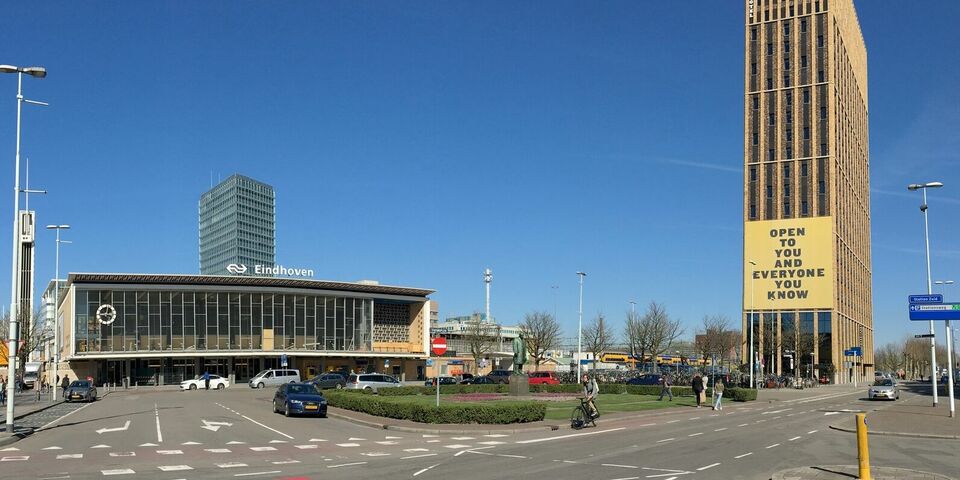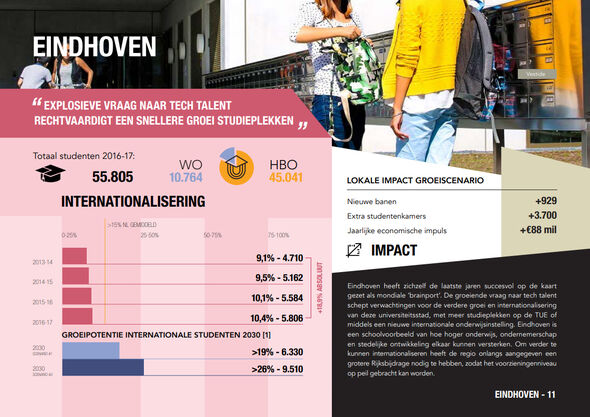‘Thousands of jobs thanks to foreign students’
Bring far more foreign students to the Netherlands, said a think-tank of property developers and others yesterday. For major cities, this can get the economy flourishing and create tens of thousands of new jobs. In a report published by the think-tank, Eindhoven's growth potential, calculated as far ahead as 2030, is estimated at 929 additional jobs and 3,700 additional student rooms. The city's annual economic gain is put at 88 million euros.
Foreign students are downright good for the economy of student cities, says think-tank The Class of 2020 in a pithy report. After all, more students mean more employment in the city. And if these academic high-achievers settle down here, that's even better. International students will bring the Treasury 1.57 billion euros per year, the internationalization organization Nuffic has calculated previously. And these are good students: they get high grades and study faster than Dutch students.
Why not?
So why shouldn't we try to bring far more foreign students here, wonders The Class of 2020. There are now some eighty thousand foreign students in the Netherlands, but that number could triple.
The report compares some Dutch cities and calculates the gain created by the arrival of additional foreign students. Outstripping the field is Maastricht, already the Netherlands' most international student city. This city could stand to make a cool 473 million euros profit per annum.
For Eindhoven the city's economic gain is considerably less: 88 million euros. According to the researchers this is because most degree programs in higher professional education (HBO) are not yet taught in English, which is keeping growth in the numbers of international students at a relatively modest level. In the most favorable scenario that number rises from 5,806 in the academic year 2016-2017 to 9,510 in 2030. In Enschede, for example, the researchers expect considerably stronger growth: from 4,623 to 11,440 international students. There, the annual impact rises in line with this to 161 million euros.
But if all these forecasts are to be achieved, much more student accommodation will certainly be needed, the report warns. And this would mean the Netherlands having to scrap all kinds of rules governing the housing market. 'The present overregulation unnecessarily excludes national and international investors,' the report says.
Welcoming
This recommendation comes as no surprise. The Class of 2020 was founded in 2011. This Amsterdam-based organization does research into the housing market for students and organizes conferences. It has created a network focused on making student accommodation efficient, international and welcoming.
Its partners include property developers, educational institutions, and city leadership officials. The list includes, for example, internationalization organization Nuffic, universities association VSNU, and the Netherlands Association of Universities of Applied Sciences, as well as The Student Hotel, Property EU, Casa, Bouwfonds IM and Xior Student Housing.
“I recognize the picture the report paints,” says director Ardin Mourik of the knowledge center for student housing agencies Kences. His organization is not involved in The Class of 2020. “The impact of students on the economy of cities is something we ourselves have had studied in the past.”
The urban economy is known to grow when more students arrive, says Mourik. “It is with good reason that The Hague, for instance, is keen to become a genuine student city. There are opportunities to be had for building the reputation of Dutch student cities as knowledge cities.”
The internationalization of higher education is meanwhile coming under increasing fire. The political world is sensitive to the criticism that degree programs are increasingly 'anglicizing' and is keen to diminish this trend – although the Lower House sees no mileage in freezing foreign student numbers.



Discussion